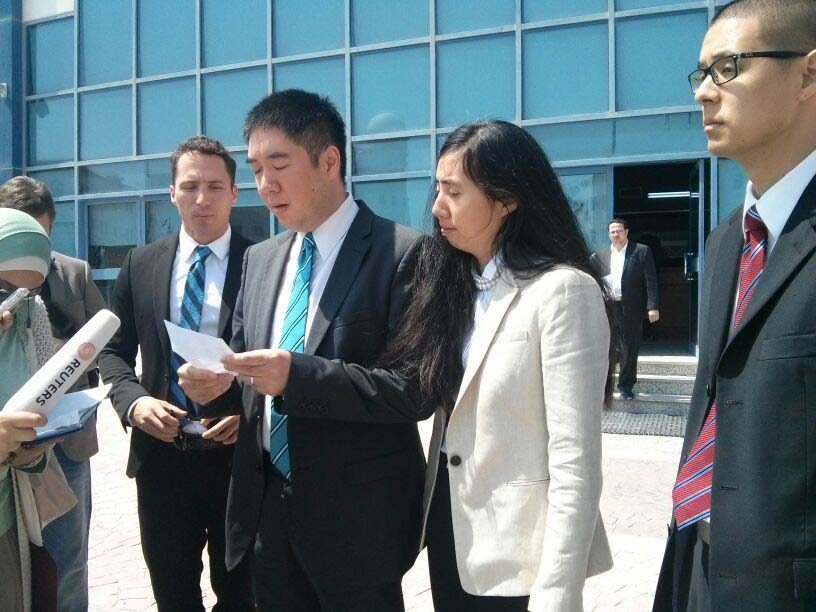
With reporting from Riham Sheble
In an unexpected verdict, a Qatar court has sentenced American couple Matthew and Grace Huang to three years in jail for the death of their daughter last year, to be followed by deportation. They were also told to pay QR15,000 in fines each.
The couple has been accused of murdering one of their three adopted children. Gloria died suddenly last January of causes no medical examiner has been able to pinpoint.
“We have just been wrongfully convicted and we feel as if we are being kidnapped by the Qatar judicial system,” Matthew Huang said outside the courthouse this morning, reading from prepared remarks.
The judge did not explain what the couple was convicted of. The Huangs have two weeks to appeal the verdict, and remain out of jail for now.
Outside the courtroom, lawyer Sami Abu Shaikha could be heard telling the couple, “There is justice, but not 100 percent.”
Later on in the day, he told Doha News that he expects the appeals hearings to begin in May. He added:
“In essence, I am satisfied with the verdict because what it really means is that we have managed to convince the court (the presiding judge) that the death of Gloria was not an intentional, premeditated murder, which is the narrative presented by the prosecutor.
Of course, I would have been more satisfied had the Huangs been found entirely innocent. This is why we will file an appeal. But I praise the Qatari court for their understanding and ruling.”
If the couple’s appeal fails, they will still get time served for the 11 months spent in prison last year, a court interpreter told Doha News. According to Abu Shaikha, a jail year in Qatar is nine months, not 12. Thus, Matt and Grace Huang have served 11 months of a 27-month sentence, and would have 16 months left.
In a statement released shortly after the ruling, the Huangs said:
“The prosecutor accused us of trafficking our legal adopted children with the intent of selling their organs. That is how ridiculous this is… So we are calling on the United States President Obama to call the Head of State in Qatar and explain to him why American families adopt high-needs children.
This verdict should be overturned immediately and we should be allowed to go home.”
Supporters of the couple included the California Innocence Project, a program run by the California Western School of Law that works to clear people who are charged with crimes they apparently didn’t commit.
The CIP, which usually focuses on US cases but made an exception for the Huangs, launched a website with the David House International Crisis agency and American law firm Lewis and Roca to refute the accusations against the couple.
It was updated earlier this month to ask supporters to “take no action or personal advocacy.”
There was also an 18-day prayer guide for supporters, which included asking God to help the couple be strong, heal their marriage and to send dreams of righteousness to the presiding judge, prosecutor and Qatar’s attorney general, among other things.
Matt and Grace Huang spent most of last year in jail as they went through the court proceedings. A judge ordered them released in November, but said they could not leave the country pending the verdict.
The couple’s two sons have returned to the US and are staying with family members, but have been communicating with their parents on Skype for several hours a day.
Key issues
The biggest sticking point for the court appeared to be that Gloria had not eaten for four days before she died. The Huangs’ legal counsel said this was because she was battling an eating disorder that caused her to binge on food and then go for days without it.
But in his closing arguments last month, the prosecutor’s said that the parents should be found guilty of “murder by abstention” for not taking Gloria to the doctor after she refused to eat for so long.
Witnesses were also previously asked about the prevalence of interracial adoption in the US, and how common it is for mothers to homeschool their children there.
The US Embassy did not immediately comment on the verdict.
But in a US State Department briefing yesterday, a spokesperson broke the country’s silence on the issue by saying officials were worried about whether the Huangs were getting a fair trial.
Speaking to reporters, Marie Harf said:
“We have been concerned by indications that not all of the evidence was being weighed by the court and that cultural misunderstandings may have been leading to an unfair trial. We have at a senior level raised this case with the Government of Qatar on multiple occasions, most recently, I believe, in late October. But we may have talked about it more recently than that.”
Misconduct
Another issue raised by the Huang camp was an allegation of prosecutorial misconduct. Last month, the couple’s legal counsel sent a letter to Qatar’s attorney general, asking him to investigate the case.
According to the Huangs’ lawyers, the prosecutor and medical examiner presented a “fraudulent” pathology report in court that states a thorough autopsy was conducted on Gloria to test her organs and tissues for potential causes of death.
However, according to a US-based pathologist Dr. Harry Bonnell, who examined Gloria’s remains, there was no evidence that tissue samples had been removed from her brain or major organs in Qatar, meaning no analysis could have actually been performed.
“The post-mortem examination was totally inadequate by western standards. As a result, there are innumerable possible causes of death that were not ruled out,” Bonnell wrote, giving examples of diabetes, cardiac illness and several potentially fatal infections.
The Doha court also issued another high-profile verdict today, sentencing a Qatari man to the death penalty over the murder of British teacher Lauren Patterson. His accomplice received three years for helping him dispose of her body.
Thoughts?
Note: This article has been corrected to reflect the US State Department spokesperson’s name is Marie, not Maria, Harf.







